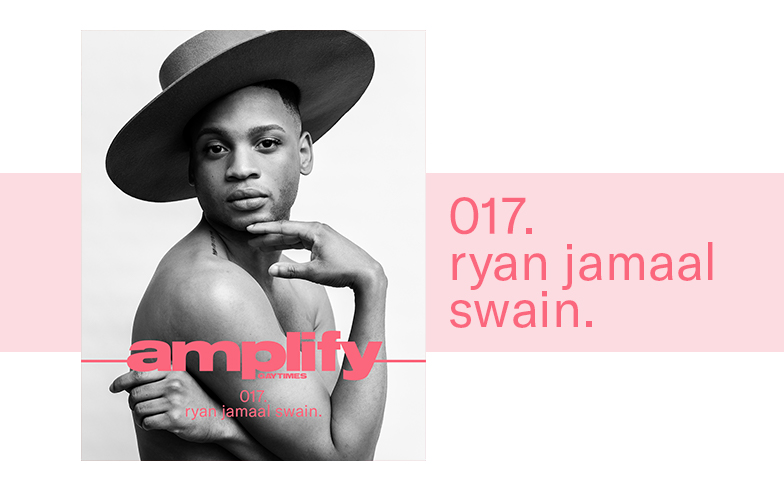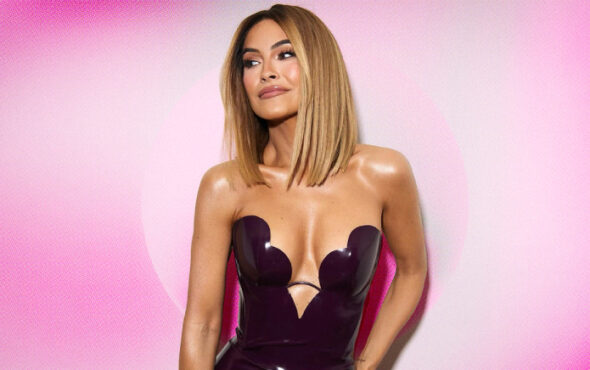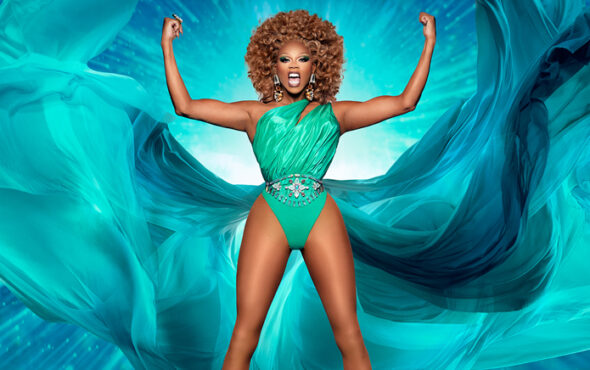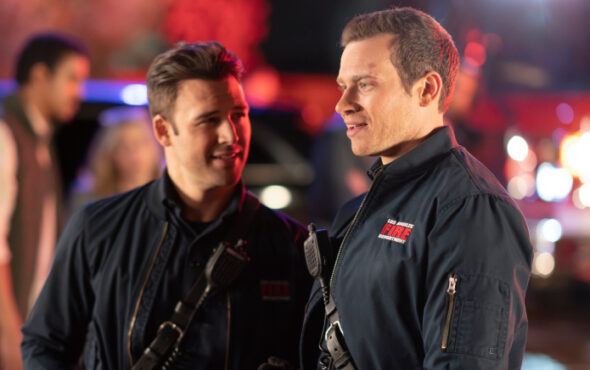
“We are entertaining but providing a space for enlightenment and another space for ecstasy,” says Pose actor Ryan Jamaal Swain early one Saturday morning Stateside, revealing how the Emmy-nominated Ryan Murphy show affected audiences.
“I have people coming up to me on the brink of tears saying how much the show has moved them, taught them, how much it has articulated a language for their family to find empathy, for them to find forgiveness – which I find very important.”
His first major gig since leaving university, Ryan’s life changed almost overnight, and with that he welcomed a new level of exposure, but also privilege, in bringing a spotlight to issues that affect those within the queer space. “It asks me to check my ignorance and educated myself on the issues and the civil rights bouts and things we have yet to accomplish when we’re talking about the LGBTQ community in relation to the community at large,” he explains. “It has pushed me into a space to be more of an activist than I’ve ever been before.”
And in 2019, a sense of activism and moving against what was once deemed as ‘the norm’ thrives him to push on. Unsurprisingly for Ryan, such drive comes from the hierarchy of privilege seen across much of the queer landscape. Check yours, and use it to help others.
“As a community, we need to not get tight when somebody talks about privilege. Yes it fucking exists, but knowing that it does, you have the power to use it and dismantle it,” the actor explains. “You don’t get to choose if you’ve got privilege or not – it’s thrust upon you. Pretty privilege, rich to poor privilege, cis people to trans privilege, white to black privilege, light-skinned black people to dark-skinned black people privilege; there’s variations of it and it’s up to us as a community to step the fuck up, understand it’s real and dismantle it so we can start really defining what it means to be a community.”
With world domination for the cast and team behind the show on the horizon, we speak to Ryan Jamaal Swain about Pose, privilege and Pride in this 50th anniversary year.
Congratulations on the international success of Pose. How has your life changed since the character Damon Richards came into your life?
Pose has completely revolutionised my normal. My normal before was get up, go to the gym, eat right and possibly try and see my friends while hoping for this thing to happen. Then when it happened, there’s this huge shift in a desire to be authentically in my space. It’s one of those things where it thrusts you into these characters world and characters trials and tribulations to really examine yourself. My life has been turned upside down and I can’t go outside without people noticing me. I have people coming up to me on the brink of tears saying how much the show has moved them, taught them, how much it has articulated a language for their family to find empathy, for them to find forgiveness – which I find very important. We are entertaining but providing a space for enlightenment and another space for ecstasy.
What has it taught you as an individual?
A lot of the conflict or the things that we’re dealing with in the show and my coming from Birmingham, Alabama, the south and nowhere near New York City where the piece is set, it asks me to check my ignorance and educated myself on the issues and the civil rights bouts and things we have yet to accomplish when we’re talking about the LGBTQ community in relation to the community at large. It has pushed me into a space to be more of an artist, activist than I’ve ever been before.
Before general release, when was the moment you knew this piece was revolutionary?
It was prior to me booking the job. My agent sent me the script and I had never seen or heard or read anything in my life that was so gritty, honest, authentic to the stories of black and brown queer people and LGBTQ people. The next step was the conversations that the show was having around the HIV/AIDS epidemic, and how it wasn’t trying to place fear inside people but was providing empathy and a space of understanding. I’ve also never seen a queer young male being kicked out of his home and put into another home with, at the helm, a trans woman taking him in – and having women of the trans experience be the heroines. That was a phenomenal investigation that I think the team really accepted and put into action. I realised then that we were at the start of something very singular and special. And then Damon and Ricky’s story is so prominent and you get to see young queer love on a national television show that provides itself with complexities and not just gives you stereotypes that aren’t complex.
This is your first major job outside of university, did you ever suffer with imposter syndrome?
Oh absolutely, all the time! At the beginning of this process, I had a bit of imposter syndrome as I asked, ‘Why is this happening to me? I don’t believe I’m adequate enough to step into this work because I haven’t gotten through the trenches of going through background to co-starring to starring’. It went from zero to 60 as I went from just graduating from university to… this! This is the job, catch up! That can be very jarring for any young person but specifically black folk. We are not afforded the platform to develop emotional nuance, emotional safety and physical safety because our bodies have been weaponised and our consciousness has not been valued.
As queer people, we’ve been told our stories aren’t commercially bankable and won’t appeal to a mainstream audience. Isn’t Pose a huge middle finger to that outdated theory?
Absolutely, it’s the biggest ‘fuck you’ to every naysayer. What’s so brilliant about Pose is that it shows you can do these stories authentically, you can hire the people behind the scenes and also in front of the camera and it can sell, and you can shut the fuck up about it not selling. It’s now you resting on the fact it’s not been commercially successful because nobody had been given the chance or time to place their platform and be there; do it or push it. It fucking blows my mind that we have these conversations around buzzwords – inclusion and diversity.
Are you inspired to weaponise your body and yourself as a queer person of colour to be present and exists beyond a voice on television?
I think that as a black person in America and wherever we are in this world, our bodies are political. We are political because they have been talked about, investigated, talked over and prodded in a way that we have become the epitome of behaviour modification and masters of how we use what has happened to us. Being ostracised and being thrust into society without any type of spaces or owning our voices, words and minds, and then we get to these places where they’re like, ‘Oh so what do you need or want?’ Well I’ve been a space of servitude and a space of mental slavery. From me, it started at university, it really revolutionised and weaponised my brain to what it means to truly be on the front line of social change and having the power to shift hearts and minds through my work and make opportunities for others.
How does Pose add to this?
Pose, with just the subject matter and such good company with this cast. We’re not just out here being activists or revolutionary for show or for pictures, it’s something we constantly talk about on set in specific rooms and in discussion forums within our own private social groups. It’s given me the space to realise that being a black man is intimidating. Being a black queer male is even worse – like nobody knows what to do with that.
You identify as queer, right?
Yes, and thank you so much for asking that. Jesus. Sexuality for me is on a spectrum. We are so many things. All of us have within us masculine and feminine energy, submissive and dominant energy. For so much of how we’ve been taught to love, we don’t investigate that, which then has you dealing with halves, 75%, 25% of these human beings instead of tapping into 110% of who people are. I don’t believe that marriage is for everybody, I feel like there are some people who are supposed to be polyamorous and some are suppose to be asexual or be pansexual. That’s okay, that is okay, but when we try to deem what is right and what is wrong, that’s when we find conflict and that’s when we find unhappy people recycling trauma in their own relationships. Queerness is how I identify. Being queer, that’s how I identified when I came out.
I know you’ll be taken out and killed if you tell us anything about season two of Pose, but spill the T, hunni.
Pose season two… wow! I’m smiling just thinking about it because it’s going to be the next step in the journey. You’re going to see everyone trying to figure out who they are as people and going forth and going in the direction of their dreams. Everybody is in pursuit of their voice and that’s what each hero is yearning for. There’s this glimmer, this shining shimmering moment that could be if their dreams are realised. Sometimes our ambitions speak before our physical material beings are ready. I think that is what is fascinating of the push and pull of a dream, wanting to go for it but having your ambition be bigger than what your physical body is ready for. Not even just Damon but everybody, they’re thinking about wanting that. ‘Oh, I want this’, and then going after it – and the consequences of them going after it. It’s about folks that want to say ‘yes’ to life. Folks that show up for their lives and are close to giving up. We’re going to deal with the AIDS epidemic and how that was with 1989/90 for civilisation and queer people in general fighting for their lives. You’re going to see people trying to zone in on what they need to do before their time is up.
Were there moments on set that surprised you?
Oh, yes, yes, yes! You don’t get any time to breathe, sit back or… you’re on this ride from the beginning and on a high velocity, high intensity, high drama ride from the beginning and hopefully until the end. Just get ready, that’s all I can say. That’s all I can say because baby, there will be more than enough. Oh my goodness!
And finally, it’s now the 50th anniversary of the Stonewall Riots, and the face of Pride has changed so much since then. What do you think Pride stands for in 2019?
It’s about really, really, really, really, really investigating what actually happened, who was actually on the front lines of social change, giving people their actual dues, and checking each and every one of our privileges so we can become more inclusive. I find it fascinating that I didn’t know Marsha P. Johnson and Sylvia Rivera, these beautiful brown folk at the front line of the movement, because they were erased from the movement in such a way that didn’t give them the space to be. I had to go and look for them instead of it being taught to me. I find, on this 50th anniversary, we’ve accomplished so much but I’m not resting on that. We must continue to do the work so our youth, like Nigel Shelby, aren’t the norm.
I find that when talking about LGB communities, we’re often leaving out TQIA+ because we’ve stopped digging for answers. If we identify as a community, we need to dissect, investigate and act on being a community because for so much of the movement, there’s so many black and brown folks who are on the lowest rung. Trans women are not being afforded the proper protection and trans rights are literally being talked about and pushed and pulled. You’re really trying to cut off somebody’s humanity based on how you are feeling? As a community, we need to not get tight when somebody talks about privilege. Yes it fucking exists, but knowing that it does, you have the power to use it and dismantle it. You don’t get to choose if you’ve got privilege or not – it’s thrust upon you. Pretty privilege, rich to poor privilege, cis people to trans privilege, white to black privilege, light-skinned black people to dark-skinned black people privilege; there’s variations of it and it’s up to us as a community to step the fuck up, understand it’s real and dismantle it so we can start really defining what it means to be a community.
Photography Hunter Abrams
Words William J Connolly
Stylist Willyum Beck
Makeup Morgan Leigh
Hair John Cotton
Photography Assistant Nick DiLieto
Follow Ryan Jamaal Swain on Twitter here.







